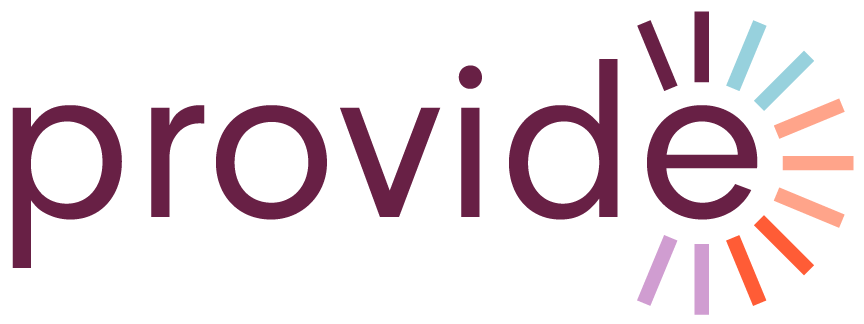As an organization, Provide has been actively updating our values and programming to align with and support reproduc tive justice principles. Part of this shift is understanding the comprehensive sexual and reproductive health needs of the clients our providers serve and ensuring that our work supports those needs. One of the ways we’re working to support providers is by seeking collaborative opportunities with groups working in stigmatized healthcare spaces to develop programming that will better prepare providers to work with people who experience unintended pregnancies as they navigate the stigma associated with drug use and abortion and to affirm client autonomy by educating clients on available options.
tive justice principles. Part of this shift is understanding the comprehensive sexual and reproductive health needs of the clients our providers serve and ensuring that our work supports those needs. One of the ways we’re working to support providers is by seeking collaborative opportunities with groups working in stigmatized healthcare spaces to develop programming that will better prepare providers to work with people who experience unintended pregnancies as they navigate the stigma associated with drug use and abortion and to affirm client autonomy by educating clients on available options.
The National Harm Reduction Coalition (NHRC) defines harm reduction as a spectrum of practical strategies and ideas aimed at reducing negative outcomes associated with drug use. Harm Reduction is also a philosophical and political movement for social justice built on a belief in, and respect for, the rights of people who use drugs.
To achieve reproductive justice for all, we need harm reduction, and to practice harm reduction as widely as possible, we need reproductive justice.
(Reah Vasilakopoulos)
Reproductive justice and harm reduction are not separable from one another, given the long history of drug use and abortion, stigmatization of these actions, and the projection of societal expectations of bodily health, pregnancy, parenting, family, and social functioning onto individual people. The stigma associated with abortion and drug use poses unique challenges for clients and providers. Stigma leads to misinformation, scare tactics, and biases that delay or block access to necessary care, and often end up informing policy and public perception. People who use drugs (PWUD) experience unintended pregnancy at a significantly higher rate. They may fear disclosing their pregnancy and talking to staff about options due to fears of arrest and other consequences such as being discharged from their treatment program.
We must acknowledge that abortion and drug use are not ‘one size fits all’ experiences and meet people where they are with culturally competent, stigma-free resources and strategies that center the needs of BIPOC, LGBTQ+, low income, and other historically marginalized communities. Reducing stigma and provider bias through a harm reduction lens calls for a client-centered approach rooted in autonomy, dignity, and medically accurate information.
Harm reduction practices have clear connections to abortion education and referrals. Both harm reduction and abortion conversations center client autonomy, acknowledge the lived reality of the people impacted, and reduce stigma related to these often-maligned services.
Currently, no resources are available to support workers in stigmatized systems of care around building their capacity to proactively, compassionately, and appropriately respond to clients who use drugs and/or need access to abortion. To address these gaps in services, Provide was awarded NHRC’s HepConnect grant to develop and implement trainings and technical assistance services that introduce and deepen harm reduction methods in Appalachian states (IN, KY, TN, NC, WV) with high rates of opioid use and restrictive abortion laws.
As leading experts in training healthcare and social service providers, we have proven success in implementing cultural and behavioral change within systems and institutions. We began developing our HepConnect Program by forming an advisory board made up of PWUD to learn more about how to integrate their needs and perspectives into programming, and we asked providers about interventions that would help them implement structural change in their organizations. We used this feedback to develop a four-hour virtual training called Connecting Abortion Referrals and Harm Reduction: How You Can Combat Stigma and Promote Autonomy. This training is designed to help providers understand how stigma against PWUD and people seeking abortion is perpetuated, what they can do in their roles to support clients in an affirming, judgment-free way, and how to combat stigma in their individual interactions, their environments, and their organizations.
Our goal is to encourage providers who work with PWUD to consider client needs around abortion care and proactively give clients the information and resources that will allow them to make decisions that are best for them. By respecting the variety of ways in which people live their lives and helping them to fulfill their choices, we can better understand one another, meet needs in a helpful manner, and make room for life lived in its many forms. By recognizing and combatting stigma and personal biases, providers can help connect their clients who use drugs and clients seeking abortion to quality, empathic care that centers their autonomy and humanity.
